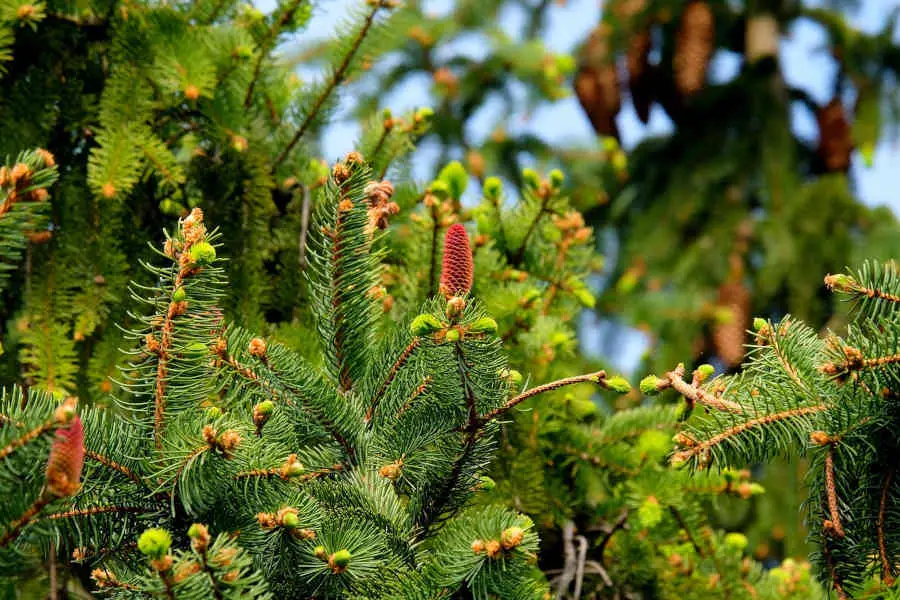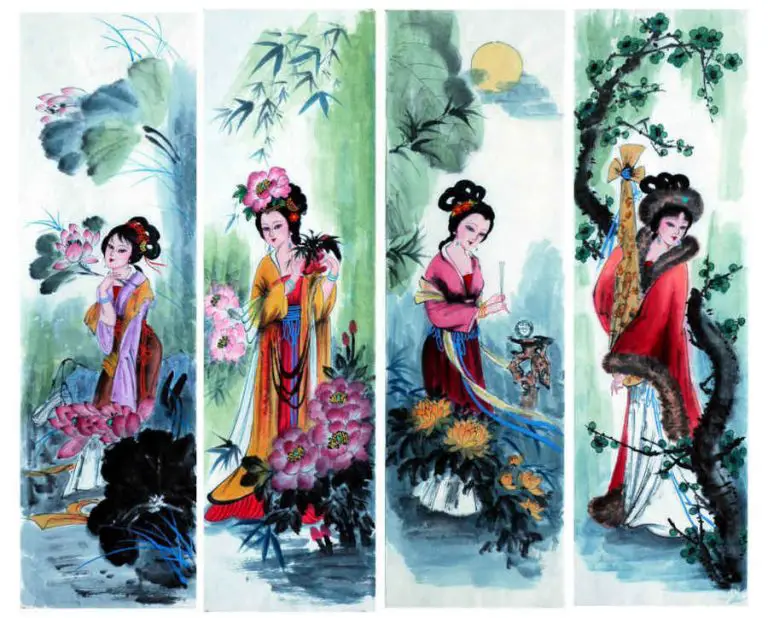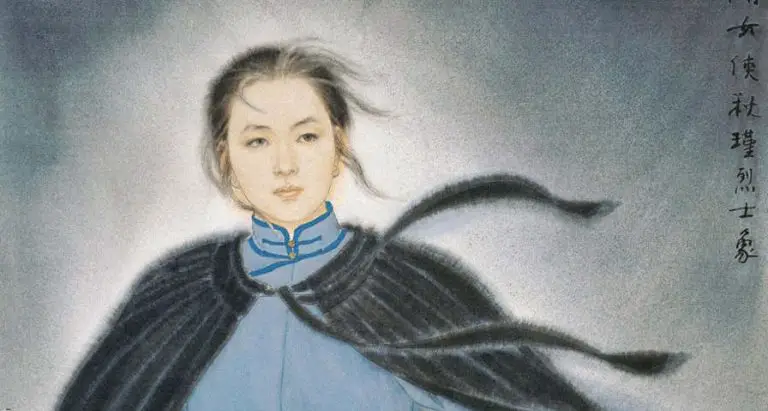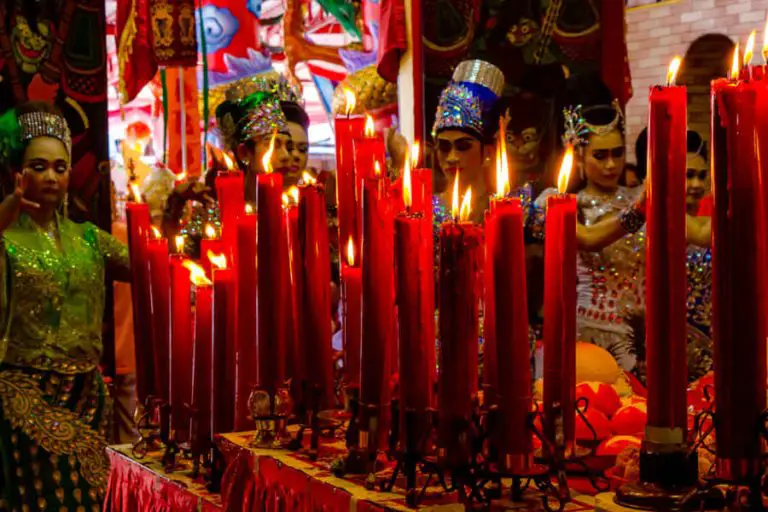Standing tall through the harshest winters, the pine tree, known as song (松) in Chinese, is a symbol of unwavering strength, resilience, and longevity. Unlike other trees that wither in the cold, the pine remains vibrant and green, embodying endurance in the face of adversity. In Chinese culture, this evergreen nature has long been admired, making the pine tree a revered emblem of steadfastness, wisdom, and vitality.
For centuries, scholars, poets, and artists have drawn inspiration from the pine tree’s unyielding spirit. It represents not only survival but also the ability to thrive despite hardships. In times of uncertainty, the pine tree reminds us to stand firm, to adapt, and to embrace the ever-changing seasons of life with dignity and grace.
Deeply rooted in Chinese philosophy, the pine tree has been cherished across dynasties and traditions. Confucian teachings highlight its perseverance as a metaphor for integrity and moral strength. Daoist sages, often depicted meditating under ancient pines, saw it as a bridge between the earthly and spiritual realms. Even in folk traditions, the pine tree is associated with protection, warding off evil spirits and attracting auspicious energy.
The pine is also a common sight in temple gardens, ancestral halls, and traditional courtyards, symbolizing blessings for a long and prosperous life. During the Chinese New Year and other celebrations, pine branches are sometimes displayed to invite good fortune, ensuring stability and success in the year ahead.
In Feng Shui, the pine tree is a powerhouse of positive energy. It is associated with longevity, strength, and protection, making it a valuable addition to any home or garden. The tree’s deep roots create a sense of grounding, while its evergreens promote continuous growth and renewal.
Across culture, mythology, and Feng Shui, the pine tree remains a timeless beacon of resilience and auspicious energy. In the sections ahead, we will explore its deep-rooted significance and how you can incorporate its powerful essence into your life.
The Pine Tree in Chinese Culture
In Chinese culture, the pine tree is one of the most revered symbols of longevity and endurance. Its ability to thrive in harsh conditions—standing firm against snow, wind, and drought—makes it a powerful metaphor for resilience and inner strength. The pine’s evergreen nature represents vitality and unyielding spirit, making it a popular emblem for those seeking a long, healthy, and prosperous life.
In traditional Chinese beliefs, pine trees are often planted near homes and temples to bless residents with longevity and protection. Many elderly people admire the pine as a reflection of their own journey—weathering life’s challenges while remaining steadfast and full of wisdom.
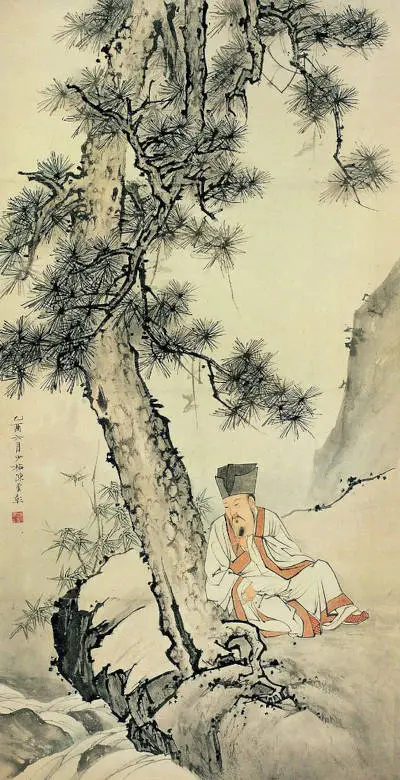
The Pine Tree in Ancient Chinese Literature and Poetry
Chinese poets and scholars have long been fascinated by the pine tree, using it as a literary device to convey themes of endurance, virtue, and steadfastness. Some of the most famous poems in Chinese history mention the pine tree as a symbol of an unbreakable will.
The great poet Su Shi (苏轼) once compared a person of integrity to a pine tree, standing tall despite life’s storms. Similarly, Tao Yuanming (陶渊明), a poet known for his love of nature, admired the pine tree’s ability to thrive in isolation, much like a scholar who remains true to his principles.
In Chinese poetry, the pine often appears alongside the bamboo and the plum blossom, forming the celebrated trio known as the “Three Friends of Winter” (岁寒三友). These three plants symbolize endurance, purity, and resilience—values deeply admired in Chinese philosophy.
Pine Trees in Chinese Art and Calligraphy
In Chinese art, pine trees are a staple subject in ink paintings, often depicted with twisting branches and gnarled trunks, emphasizing their strength and age. They frequently appear in shanshui (山水) landscape paintings, symbolizing the harmony between man and nature.
Artists often pair pine trees with cranes, deer, or rocks, creating compositions that represent longevity, wisdom, and stability. The crane, in particular, is a famous companion to the pine in Chinese art, as both are believed to bring blessings of a long and prosperous life.
In Chinese calligraphy, the character for “pine” (松) is sometimes stylized in an elegant, flowing form, embodying the balance between strength and grace. Scholars often practice writing this character to capture the essence of perseverance and nobility.
The Pine Tree and Its Connection to Confucian and Daoist Ideals
Both Confucianism and Daoism embrace the pine tree as a symbol of philosophical ideals.
In Confucian thought, the pine represents righteousness and moral integrity. Just as the pine tree stands unshaken against winter winds, a true gentleman (君子) remains steadfast in his virtues despite adversity. Confucian scholars often planted pines near academies and homes to remind themselves of the importance of perseverance and ethical living.
For Daoists, the pine tree holds a deeper, almost mystical significance. Daoist sages believed that pine trees possessed the energy of qi (气), the vital life force that sustains all things. Some Daoist legends even suggest that drinking pine needle tea or consuming pine resin could lead to immortality. Many Daoist temples are nestled among ancient pine forests, reinforcing the connection between nature, wisdom, and spiritual enlightenment.
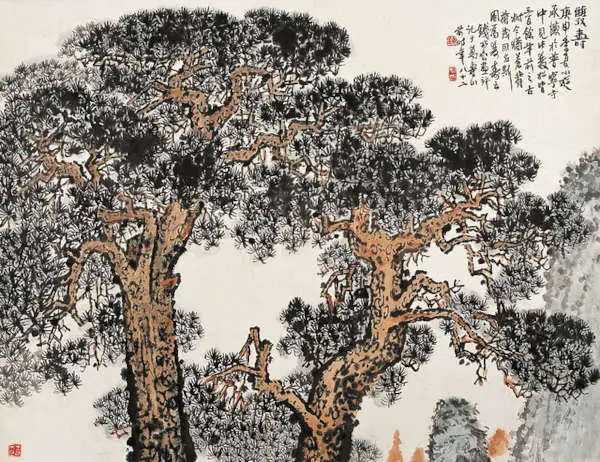
The Role of Pine Trees in Chinese New Year and Other Festivals
During Chinese New Year, pine branches are sometimes used in decorations to symbolize good fortune and enduring happiness. In some regions, people place pine sprigs at their doorsteps to ward off bad luck and welcome prosperity into their homes.
Pine trees also play a role in funeral and ancestral rites, as their evergreen nature represents eternal life and remembrance. It is common to see pine trees in cemeteries, serving as guardians of the past and symbols of respect for ancestors.
Additionally, in some folk traditions, pine cones are considered lucky and are placed on altars or gifted to loved ones to convey wishes for strength and longevity.
The Pine Tree in Chinese Mythology and Folklore
Throughout Chinese mythology, certain pine trees are believed to be more than just ordinary plants—they are seen as sacred beings with mystical powers. Legends tell of ancient pines that have lived for thousands of years, absorbing the essence of heaven and earth, and even granting wisdom or longevity to those who encounter them.
One famous tale speaks of a 1,000-year-old pine tree that turned into a guardian spirit, watching over travelers and scholars who sought shelter beneath its branches. Those who treated the tree with respect were said to receive protection, while those who tried to harm it would face misfortune.
Another one says about Zhao Qu, who, upon consuming a medicinal concoction made from pine oil, regained his health and lived to an advanced age.
Such stories reinforce the belief that pine trees possess a spiritual essence and should be revered, not cut down carelessly.
The Pine Tree and the Eight Immortals
In Daoist mythology, the Eight Immortals (八仙) are legendary figures who achieved immortality through wisdom and spiritual cultivation. The pine tree is closely associated with them, as it symbolizes their ability to withstand hardship and live eternally.
One of the Eight Immortals, Zhang Guolao (张果老), was often depicted carrying a staff made of pine wood, believed to have magical properties. Another immortal, Lü Dongbin (吕洞宾), was said to have meditated under an ancient pine tree for decades, drawing strength from its energy as he refined his Daoist skills.
Some temples dedicated to the Eight Immortals feature towering pine trees, believed to be remnants of trees they once meditated under. Worshippers visit these trees, tying red ribbons to their branches and making wishes for health and longevity.
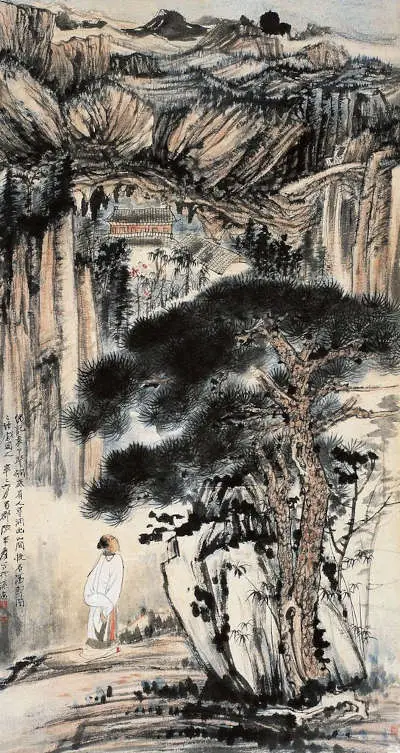
Folklore Tales of the Pine Tree’s Magic
Beyond mythology, Chinese folklore is filled with enchanting stories of pine trees possessing supernatural abilities.
One famous story tells of a pine tree that could predict the future. Located in a remote mountain village, the tree would whisper messages in the wind, warning villagers of impending disasters. When an earthquake was about to strike, the pine’s needles turned red overnight, prompting the villagers to flee—saving them from destruction.
Another tale speaks of a young scholar who befriended an old pine tree, sharing his dreams and worries with it daily. One night, in his dreams, the pine tree took human form and gifted him a jade pendant. When he awoke, the pendant was real, and he later discovered it brought him great success in the imperial examinations.
Such stories highlight the deep respect and mystical reverence Chinese culture has for the pine tree. Whether as a guardian spirit, a source of wisdom, or a bringer of good fortune, the pine is often portrayed as a magical force in folklore.
Cultural Sayings and Proverbs Related to Pines
Chinese culture is rich with proverbs (谚语) and idioms (成语) that use the pine tree as a metaphor for strength, virtue, and resilience. Here are a few well-known ones:
- “岁寒然后知松柏之后凋” (Only in the harshest winter do we see that the pine and cypress do not wither).
– This Confucian saying emphasizes that true strength of character is revealed in difficult times. - “松柏长青” (The pine and cypress stay evergreen).
– A blessing for longevity and enduring success. - “松树虽老不改其青” (Though old, the pine tree does not change its green color).
– A reminder to stay true to oneself, regardless of age or circumstance. - “松风水月” (Pine wind and water moon).
– A poetic expression of tranquility, often used to describe a life of peace and contentment.
From mythology to daily language, the pine tree remains a symbol of wisdom, longevity, and the unbreakable spirit of the Chinese people.
Related reading: Plum Blossom in Chinese Culture and Feng Shui (history, legends, how to use it)– Opens in new tab
The Pine Tree in Feng Shui
In Feng Shui, the pine tree is a powerful symbol of stability, resilience, and protection. Its evergreen nature represents endurance, longevity, and unwavering strength, making it an ideal element for cultivating positive energy in a home or garden. Unlike other trees that shed their leaves in winter, the pine remains green throughout the year, signifying continuous growth and unbreakable vitality.
The pine’s deep-rooted energy provides a sense of grounding and security, making it particularly useful for those seeking stability in their personal or professional lives. Planted in the right location, a pine tree can serve as a guardian against negative influences, shielding a home from bad luck and unwanted disturbances.
Pine Trees and the Five Elements Theory
Feng Shui is deeply connected to the Five Elements Theory (五行学说), and the pine tree primarily embodies the Wood element (木). However, its presence also interacts with other elements, influencing the energy balance in a given space:
- Wood (木) – The pine’s strong, vertical growth symbolizes vitality and personal growth, making it beneficial for career and academic success.
- Earth (土) – The deep roots of a pine tree stabilize the earth, fostering grounded energy and strengthening family harmony.
- Water (水) – When planted near water features, pine trees enhance the flow of positive qi (气), promoting financial stability.
- Fire (火) – In balance with fiery elements (such as red décor or sunlight), pines help temper excessive yang energy, creating harmony.
- Metal (金) – Pine trees near metal structures (like stone sculptures or wind chimes) amplify protective energy, deflecting negativity.
By understanding these elemental interactions, one can strategically place pine trees to enhance positive energy and maintain harmony in their environment.

The Best Placements for Pine Trees in Feng Shui
Positioning a pine tree correctly is crucial to maximizing its Feng Shui benefits. Here are the best locations to harness its energy effectively:
- Front Yard (South or East): A pine tree in the front yard serves as a protective guardian, shielding the home from negative influences while attracting prosperity. The east placement enhances family harmony, while the south placement boosts reputation and success.
- Backyard (North or West): Placing a pine tree in the backyard strengthens financial stability and career growth. The north sector is linked to career energy, while the west sector supports creativity and children’s well-being.
- Near the Entrance: A small pine tree near the main door invites longevity and good fortune, creating a welcoming and auspicious entryway.
- On a Slope or Uneven Terrain: If your property is on an incline, planting pine trees at the higher points can anchor energy and prevent qi from escaping, ensuring stability and support.
Avoid placing pine trees too close to the house, as their dense foliage can block sunlight and stagnate energy flow. Instead, position them at a balanced distance to maintain harmony.
Related reading: Geography’s Role in Feng Shui: Choosing the Right Location – Opens in new tab
How Pine Trees Enhance Health, Wealth, and Protection
Pine trees are renowned for their purifying and strengthening qualities in Feng Shui. Their presence can directly impact three key aspects of life:
- Health: The fresh, oxygen-rich air around pine trees clears negative qi, promoting physical and mental well-being. Their essential oils are also believed to strengthen the lungs and immune system.
- Wealth: As a symbol of continuous growth and longevity, pine trees help stabilize financial energy, preventing losses and ensuring long-term prosperity. When placed correctly, they attract opportunities for abundance.
- Protection: Just as ancient warriors sought refuge under pines, homes surrounded by these trees benefit from spiritual shielding. They act as a natural defense against negative forces and unwanted disruptions.
Using Pine Tree Symbols and Imagery in Interior Feng Shui
For those who cannot plant real pine trees, incorporating pine imagery and symbols indoors can still bring their powerful energy into the home:
- Pine Paintings or Scrolls: Hanging artwork featuring pine trees in the living room or study strengthens resilience and wisdom. A painting of a pine forest in the east sector enhances family unity.
- Pine Bonsai: A carefully cultivated bonsai pine placed on a desk or in a home office improves focus and career growth.
- Pine-Scented Incense or Essential Oils: The fresh scent of pine purifies the air and revitalizes the energy of a space, creating a calming and protective atmosphere.
- Wooden Pine Sculptures: Carved pine wood objects or furniture amplify stability and grounding energy, reinforcing a sense of security.
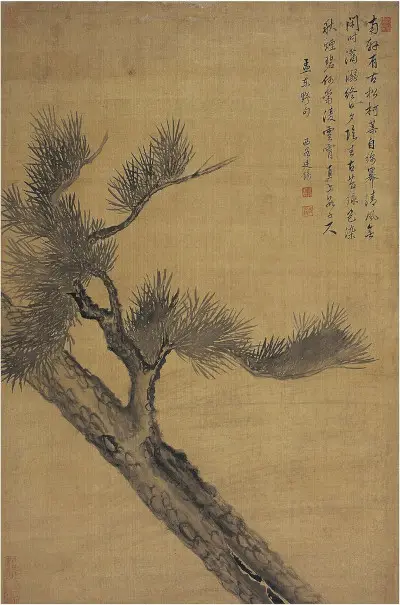
The Pine Tree and Other Auspicious Symbols
One of the most famous symbolic groupings in Chinese culture is the “Three Friends of Winter” (岁寒三友)—the pine (松), bamboo (竹), and plum (梅). These three plants are celebrated for their ability to withstand the harsh conditions of winter, making them powerful representations of resilience, perseverance, and moral integrity.
- The Pine Tree remains green and strong despite the cold, symbolizing endurance, longevity, and unyielding spirit.
- The Bamboo bends without breaking, embodying flexibility, humility, and inner strength.
- The Plum Blossom blooms in the snow, representing hope, renewal, and beauty emerging from hardship.
This trio is frequently depicted in traditional Chinese paintings, poetry, and decorative arts. Scholars and intellectuals, especially during the Song and Ming dynasties, admired these plants as reflections of ideal character traits—stability (pine), adaptability (bamboo), and perseverance (plum).
In Feng Shui, placing these three plants together in a garden or home setting invites balanced energy and encourages the qualities of wisdom, strength, and renewal in one’s life. They also serve as an auspicious symbol during Chinese New Year, reminding people of the virtues needed to overcome challenges in the coming year.
The Pine Tree and the Crane: A Duo of Longevity
Another classic combination in Chinese symbolism is the pine tree and the crane (松鹤延年), both of which represent longevity, wisdom, and spiritual enlightenment.
The crane (鹤) is one of the most revered birds in Chinese culture, often associated with the immortals and divine realms. It is believed that cranes live for centuries and serve as messengers between heaven and earth. When paired with the pine tree, their combined imagery strengthens the theme of eternal life, good health, and protection from misfortune.
This powerful duo is frequently seen in:
- Traditional Chinese paintings and scrolls – Used as auspicious gifts for elders or those recovering from illness.
- Temple carvings and home décor – Placed in homes or gardens to promote peaceful aging and a prosperous life.
- Graveyard landscapes – The pairing of pine trees and cranes is often found in cemeteries, symbolizing a peaceful transition to the afterlife.
In Feng Shui, artwork depicting pine trees and cranes is recommended for the east sector of a home, as it aligns with the energy of health and longevity.
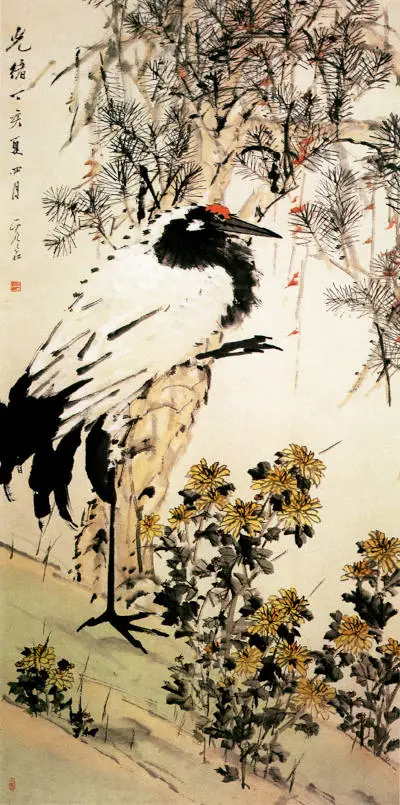
Pairing Pine Trees with Rocks and Water for a Balanced Landscape
In Chinese garden design and Feng Shui, the harmonious placement of pine trees, rocks, and water features creates a landscape filled with balanced qi (气). Each element contributes to a peaceful and prosperous environment:
- Pine Trees (Wood Element): Representing growth, endurance, and wisdom, they bring stability to a space.
- Rocks (Earth Element): Symbolizing strength, support, and grounding energy, they create a solid foundation for positive qi.
- Water (Water Element): A sign of wealth, life force, and abundance, water features like ponds or streams help energy flow smoothly.
This combination is often found in:
- Classical Chinese gardens, where carefully arranged pine trees stand beside scholar’s rocks and reflective pools.
- Daoist temple courtyards, where pine trees are paired with stone pathways and natural springs to create a sacred atmosphere.
- Feng Shui landscaping, where placing a pine tree near a rock formation enhances protective energy, while a water feature nearby encourages financial stability.
To apply this concept in a modern setting, consider placing bonsai pine trees on a rock base with a small indoor fountain to replicate the energy of a traditional Feng Shui garden. This arrangement attracts prosperity, strengthens mental clarity, and fosters a deep sense of peace.
End Words
The pine tree holds a cherished place in Chinese culture, symbolizing longevity, resilience, and virtue. Its significance extends beyond mere aesthetics; it is deeply woven into the fabric of Chinese traditions, literature, and philosophy. From its portrayal in ancient poetry to its role in Feng Shui practices, the pine tree serves as a powerful emblem of strength and endurance.
As we explore the rich tapestry of meanings associated with the pine, we see how it connects with other auspicious symbols like bamboo, plum trees, and cranes, creating a holistic representation of harmony and balance in life. Whether through its physical presence in gardens or its symbolic representations in art and decor, the pine tree invites us to embrace its qualities of perseverance and vitality.
Incorporating pine trees into our lives—be it through planting them in our gardens or adorning our homes with their imagery—allows us to harness their positive energy. By doing so, we not only honor a significant aspect of Chinese culture but also cultivate an environment that supports health, wealth, and protection.The enduring legacy of the pine tree reminds us that even in the face of adversity, we can stand tall and thrive.
Want to learn more about Feng Shui? Take a look at these Courses and Books – Aff.link
Stay in Touch
 Join our newsletter by using the forms on this website or click here!
Join our newsletter by using the forms on this website or click here! Follow us on Google News
Follow us on Google News Follow us on Facebook
Follow us on Facebook
Featured image by Holger Schué from Pixabay

